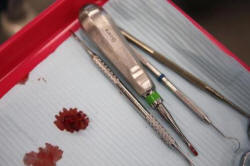|
 The
other Texas border deployment: doctors, dentists, opticians The
other Texas border deployment: doctors, dentists, opticians
 Send a link to a friend
Send a link to a friend
[August 15, 2014]
By Jon Herskovitz
MISSION Texas (Reuters) - For the Texas
State and National Guard, Operation Lone Star is a disaster preparedness
exercise. For public health experts, it is a humanitarian mission. And
for Itzel, a teenage schoolgirl, it is a chance to finally get glasses
so she can read textbooks.
|
|
 Operation Lone Star started 16 years ago to help the guard prepare
for emergencies such as hurricanes or pandemics in south Texas.
Since then it has expanded its medical care component, treating
thousands in a region that hugs the Mexican border, including some
who come because no identification papers are required. Operation Lone Star started 16 years ago to help the guard prepare
for emergencies such as hurricanes or pandemics in south Texas.
Since then it has expanded its medical care component, treating
thousands in a region that hugs the Mexican border, including some
who come because no identification papers are required.
"It feels weird to see things in focus," Itzel said as she tried on
newly made prescription glasses.
Itzel was among more than 10,000 people who received care at last
week's Operation Lone Star, held at five sites in four border
counties. Because the people are medical patients, Texas privacy
laws do not permit them to be formally identified.
Public health officials said it makes sense to piggy back on the
guard's emergency relief drills, which are not related to a move by
Governor Rick Perry to deploy Texas National Guard troops to the
Mexican border in order to bolster security. The guard has been
joined in recent years by medical aid groups such as Remote Area
Medical, which operates in places ranging from Appalachia to
sub-Saharan Africa.

"This is first and foremost a training exercise, but it also turns
out to be a humanitarian effort," said John Villarreal, spokesman
for the Texas Department of State Health Services.
The need for free medical care is great in Texas, where about a
quarter of the state's 26.5 million people lack health insurance,
and particularly acute in the Hispanic communities along the border,
many of which are mired in poverty.
About 300 military staff members including medical professionals,
200 state and local employees, Baylor University dental school
students, and scores of volunteers staffed the operation.
Services included immunizations, diabetes screenings and physicals
for students, as well as hearing and vision exams. The Texas plan is
being studied by other states looking to use it as a model for
dispensing public health care.
"We do not require ID at Operation Lone Star because if a disaster
were to hit this area, it wouldn’t be about checking ID. It would be
about saving lives," Villarreal said.
For most of those who lined up each day at the five sites, it was
their only chance to see a doctor for the year.
Remote Area Medical brought dozens of portable dental chairs, as
well as equipment for vision exams and equipment to grind lenses for
prescription eyeglasses and fit them into frames.
[to top of second column] |

The benefits for the state come from tracking thousands of people as
they move from triage to treatment and coordinating work with
volunteer agencies.
"If it is a person in Texas and they have a contagious illness,
whether they are legal or illegal, if they pass it on to another
person, then Texas ends up suffering," said Robert Morecook, a
colonel in the Texas State Guard's Medical Brigade.
For many living hand-to-mouth along the border, the clinic fits into
a dual-nation strategy to obtain medical care as cheaply as
possible.
"The document thing is big for a lot of people around here. It makes
it easier for them if they don't have to bring IDs," said Denisse,
one of hundreds who had lined up beginning in the pre-dawn hours to
receive care.
Stan Brock, the founder and president of Remote Area Medical, wants
the U.S. government to make it easier for doctors to cross state
borders to work as medical volunteers, which would bring more care
to more people in need.
"Some people may argue that this is a Band-Aid. But for the person
who comes in ... and has never been to a dentist in their life, or
doesn’t know what a leaf looks like on a tree until they get
glasses, that is a life-changing experience," Brock said.
(Reporting by Jon Herskovitz; Editing by Leslie Adler and Lisa
Shumaker)
[© 2014 Thomson Reuters. All rights
reserved.] Copyright 2014 Reuters. All rights reserved. This material may not be published,
broadcast, rewritten or redistributed.
 |